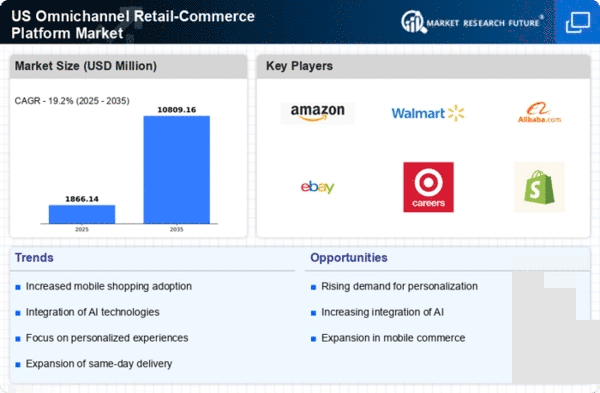Competitive Landscape
The competitive landscape within the omnichannel retail-commerce-platform market is intensifying, as both established players and new entrants vie for market share. This competition is prompting retailers to innovate and differentiate their offerings. According to industry reports, the market is projected to grow at a CAGR of 20% over the next five years, driven by the need for businesses to adopt omnichannel strategies to remain relevant. Retailers are increasingly investing in technology and infrastructure to enhance their omnichannel capabilities, which may include improving logistics and supply chain management. This competitive pressure is likely to foster a dynamic environment, encouraging continuous improvement and adaptation within the omnichannel retail-commerce-platform market.
Consumer Data Utilization
The effective utilization of consumer data is becoming increasingly critical in the omnichannel retail-commerce-platform market. Retailers are leveraging data analytics to understand consumer preferences and behaviors, enabling them to tailor their marketing strategies accordingly. Approximately 65% of retailers in the US report that data-driven decision-making has significantly improved their customer engagement efforts. By harnessing insights from various data sources, businesses can create personalized shopping experiences that resonate with consumers. This focus on data utilization not only enhances customer satisfaction but also drives sales growth, positioning retailers favorably within the competitive landscape of the omnichannel retail-commerce-platform market.
Supply Chain Optimization
Supply chain optimization is emerging as a crucial driver in the omnichannel retail-commerce-platform market. As consumers increasingly expect faster delivery times and greater product availability, retailers are compelled to refine their supply chain processes. Efficient inventory management and logistics are essential for meeting these demands. Recent studies indicate that retailers who invest in supply chain technology can reduce operational costs by up to 15%, thereby enhancing their profitability. By streamlining their supply chains, businesses can ensure that they are well-equipped to respond to consumer needs, ultimately strengthening their position in the omnichannel retail-commerce-platform market.
Technological Advancements
Technological advancements play a pivotal role in shaping the omnichannel retail-commerce-platform market. Innovations such as artificial intelligence, machine learning, and data analytics are enabling retailers to optimize their operations and enhance customer engagement. For instance, AI-driven chatbots are increasingly utilized to provide real-time assistance, improving customer satisfaction. Furthermore, the integration of advanced analytics allows retailers to gain insights into consumer behavior, facilitating targeted marketing strategies. As technology continues to evolve, it is anticipated that the omnichannel retail-commerce-platform market will witness further enhancements, potentially leading to increased efficiency and profitability for businesses.
Evolving Consumer Preferences
The omnichannel retail-commerce-platform market is experiencing a notable shift in consumer preferences, as shoppers increasingly demand seamless integration across various channels. This evolution is driven by the desire for convenience and personalized experiences. According to recent data, approximately 73% of consumers in the US prefer shopping through multiple channels, indicating a strong inclination towards omnichannel strategies. Retailers are compelled to adapt their offerings to meet these changing expectations, which may involve enhancing their digital interfaces and ensuring consistent messaging across platforms. As a result, businesses that effectively align their operations with consumer preferences are likely to gain a competitive edge in the omnichannel retail-commerce-platform market.
















